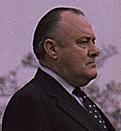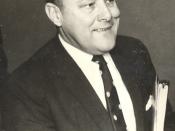Robert Muldoon was one of the most powerful political figures in New Zealand. Having huge influences on New Zealand politics for almost 20 years, his way and his character were familiar to most New Zealanders in the 70's and 80's.
South Africa shocked the world in 1948 when a government that supported a policy called apartheid was elected. This meant that people were separated according to race, sports were also interfered as different races were banned from playing sport together. Many countries stopped playing sports with South Africa, excluding New Zealand. For New Zealand to play their nation sport Rugby against the South African team the Springbok, the New Zealand Rugby Union stated to pick an all white all black team to represent the country. This outraged many people in New Zealand, they believed that if we agreed to play rugby with racist rules then New Zealand will be seen as accepting apartheid.
Muldoon and his national party won the New Zealand election in 1975, keeping his promise of not interfering with sports, unlike Norman Kirk the last prime minister, Muldoon did not stop the All Blacks going to South Africa in 1976 despite tens of thousands of protesters. To show their displeasure at his action, 21 nations mostly African, walked out of the Montreal Olympic Games.
To talk about the damages between African counties and New Zealand, the 1977 Commonwealth meeting at Gleneagles resulted in the Gleneagles Agreement. This agreement put pressure on Muldoon to stop any connections with South Africa. However Muldoon interpreted the agreement that it was a matter for individual sporting parties to decide if they want to tour with South Africa.
Muldoon's understanding of the agreement meant that the governments did not prevent the Springbok rugby team's tour of New Zealand in 1981. This...


